1, Experimental purpose
1. Understand and master the assembly source program of more than 8086 logic segments
2. Understand and skillfully apply flexible addressing methods
3. Understand the essence of loop in programming language through the use of assembly instruction loop, and master its correct use in nested loop
4. Master the method of debugging 8086 assembler with debug
2, Experimental content
1. Experimental task 1
Experimental task 1-1
task1_1.asm
assume ds:data, cs:code, ss:stack data segment db 16 dup(0) ; 16 byte units are reserved, and the initial values are 0 data ends stack segment db 16 dup(0) ;16 byte units are reserved, and the initial values are 0 stack ends code segment start: mov ax, data mov ds, ax mov ax, stack mov ss, ax mov sp, 16 ; Set stack top mov ah, 4ch int 21h code ends end start
In debug, it will be executed until the end of line17 and before line19,
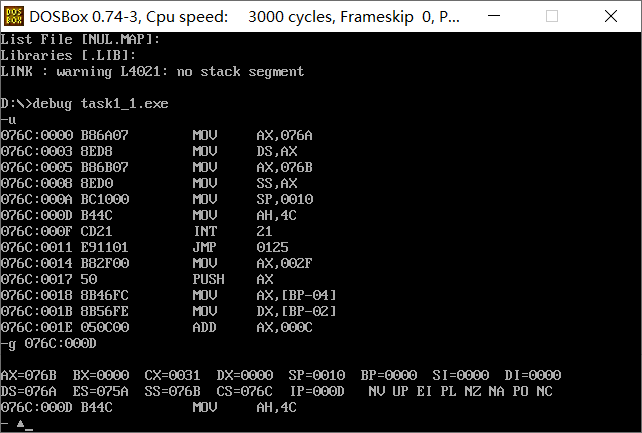
① Record: register (DS) =_ 076A_, Register (SS) =_ 076B_, Register (CS) =_ 076C_
② Assuming that the segment address of the code segment is X after the program is loaded, the segment address of the data segment is X_ X-2_, The segment address of stack is_ X-1_.
Experimental task 1_ two
task1_2.asm
assume ds:data, cs:code, ss:stack data segment db 4 dup(0) ; Four byte units are reserved, and the initial value is 0 data ends stack segment db 8 dup(0) ; 8 byte units are reserved, and the initial values are 0 stack ends code segment start: mov ax, data mov ds, ax mov ax, stack mov ss, ax mov sp, 8 ; Set stack top mov ah, 4ch int 21h code ends end start
In debug, it will be executed until the end of line17 and before line19,
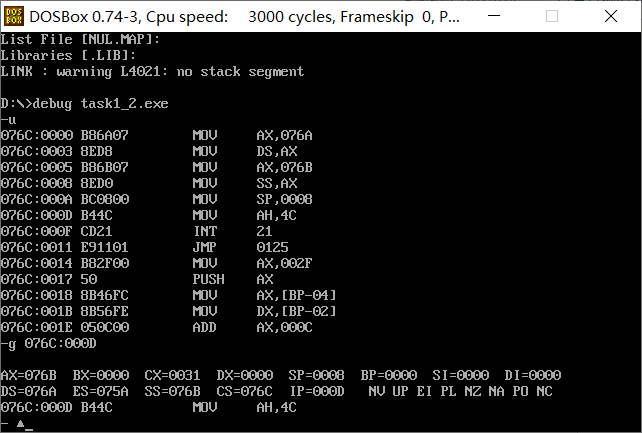
① In debug, execute until the end of line17 and before line19. Record this time: register (DS) =_ 076A_, Register (SS) =_ 076B_, Register (CS) =_ 076C_
② Assuming that the segment address of the code segment is X after the program is loaded, the segment address of the data segment is X_ X-2_, The segment address of stack is_ X-1_.
Experimental task 1_ three
task1_3.asm
assume ds:data, cs:code, ss:stack data segment db 20 dup(0) data ends stack segment db 20 dup(0) stack ends code segment start: mov ax, data mov ds, ax mov ax, stack mov ss, ax mov sp, 20 mov ah, 4ch int 21h code ends end start
In debug, it will be executed until the end of line17 and before line19,
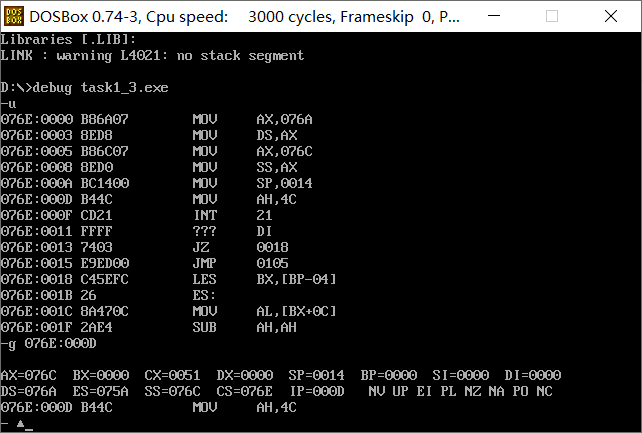
① Record: register (DS) =_ 076A_, Register (SS) =_ 076C_, Register (CS) =_ 076E_
② Assuming that the segment address of the code segment is X after the program is loaded, the segment address of the data segment is X_ X-4_, The segment address of stack is_ X-2_.
Experimental task 1_ four
task1_4.asm
assume ds:data, cs:code, ss:stack code segment start: mov ax, data mov ds, ax mov ax, stack mov ss, ax mov sp, 20 mov ah, 4ch int 21h code ends data segment db 20 dup(0) data ends stack segment db 20 dup(0) stack ends end start
In debug, it will be executed until the end of line9 and before line11,
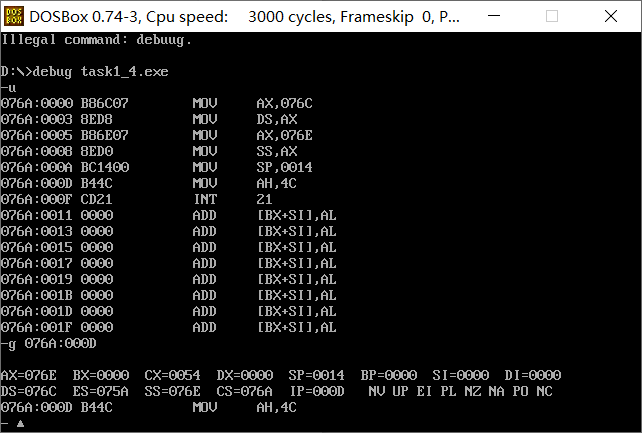
① Record: register (DS) =_ 076C_, Register (SS) =_ 076E_, Register (CS) =_ 076A_
② Assuming that the segment address of the code segment is X after the program is loaded, the segment address of the data segment is X_ X+2_, The segment address of stack is X+4_.
Experimental task 1_ five
Based on the practice and observation of the above four experimental tasks, summarize and answer:
① For the segment defined below, after the program is loaded, the actual memory space allocated to the segment is_ 16*[N/16]_.
xxx segment db N dup(0) xxx ends
② If the program Task1_ 1.asm, task1_ 2.asm, task1_ 3.asm, task1_ 4. In ASM, if the pseudo instruction end start is changed to end, which program can still be executed correctly? The reasons are analyzed and explained in combination with the conclusions obtained from practical observation.
task1_1 cannot be executed correctly
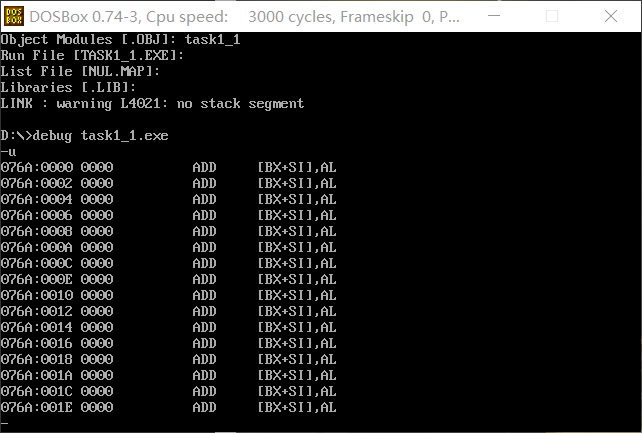
task1_2. It cannot be executed correctly
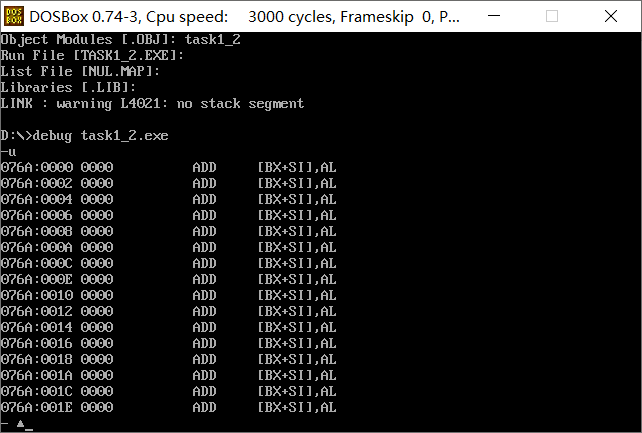
task1_3. It cannot be executed correctly
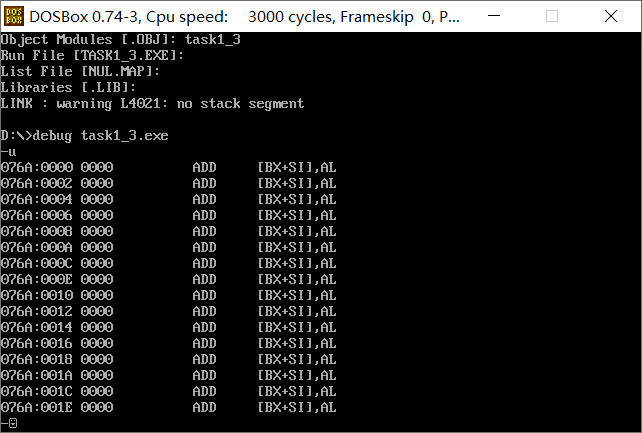
task1_4. It can be executed correctly
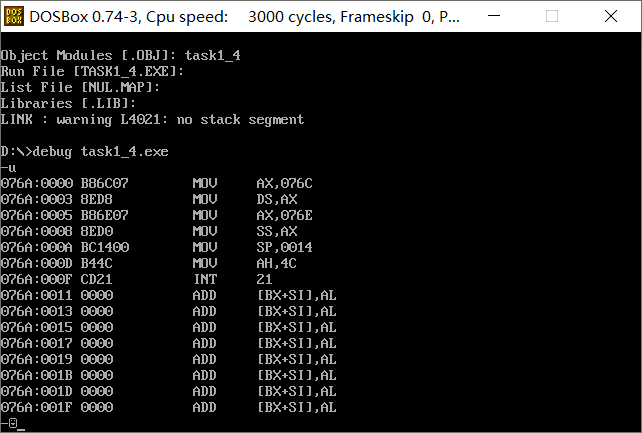
Reason: after it is changed to end, the execution starts from the program code header by default, while the program header of 123 is not a program segment. If it is executed directly from the header, an error will occur.
2. Experimental task 2
Write an assembly source program to realize 160 consecutive bytes to memory units b800:0f00 ~ b800:0f9f, and fill hexadecimal data 03 and 04 repeatedly in turn.
assume cs:code code segment mov ax,0b800h mov ds,ax mov ax,0403h mov bx,0f00h mov cx,160 s: mov [bx],ax inc bx inc bx loop s mov ax,4c00h int 21h code ends end
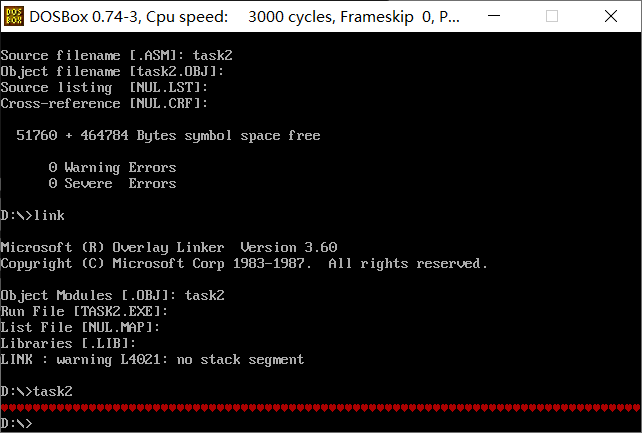
3. Experimental task 3
task3.asm
assume cs:code data1 segment db 50, 48, 50, 50, 0, 48, 49, 0, 48, 49 ; ten numbers data1 ends data2 segment db 0, 0, 0, 0, 47, 0, 0, 47, 0, 0 ; ten numbers data2 ends data3 segment db 16 dup(0) data3 ends code segment start: mov bx,0 mov cx,10 s: mov dx,0 mov ax,data1 mov ds,ax add dl,[bx] mov ax,data2 mov ds,ax add dl,[bx] mov ax,data3 mov ds,ax add [bx],dl inc bx loop s mov ah,4ch int 21h code ends end start
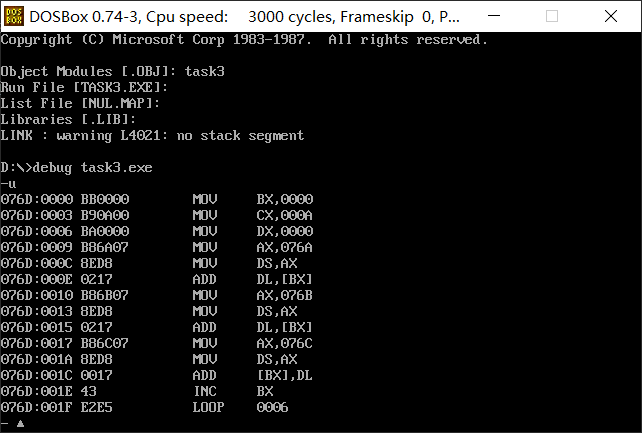
Before adding:

After addition:

4. Experimental task 4
task4.asm
assume cs:code data1 segment dw 2, 0, 4, 9, 2, 0, 1, 9 data1 ends data2 segment dw 8 dup(?) data2 ends code segment start: mov ax,data1 mov ds,ax mov ax,data2 mov ss,ax mov sp,16 mov bx,0 mov cx,8 s: push [bx] add bx,2 loop s mov ah, 4ch int 21h code ends end start
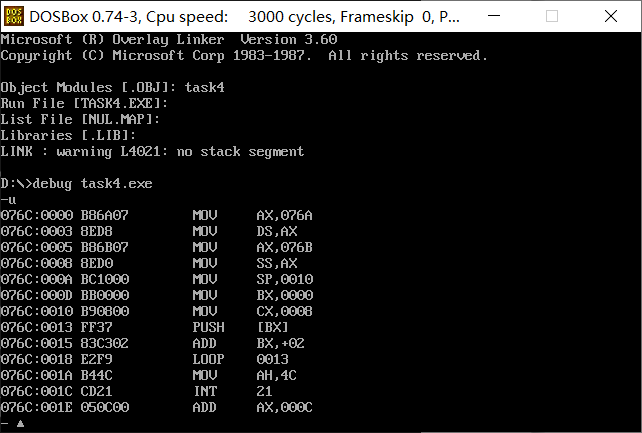
Before program execution:

After program execution:

5. Experimental task 5
task5.asm
assume cs:code, ds:data data segment db 'Nuist' db 2, 3, 4, 5, 6 data ends code segment start: mov ax, data mov ds, ax mov ax, 0b800H mov es, ax mov cx, 5 mov si, 0 mov di, 0f00h s: mov al, [si] and al, 0dfh mov es:[di], al mov al, [5+si] mov es:[di+1], al inc si add di, 2 loop s mov ah, 4ch int 21h code ends end start
Assemble and link the program to get the executable file, run and observe the results
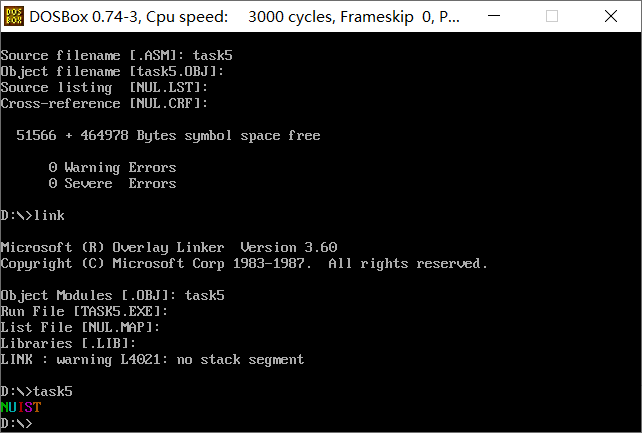
Use the debug tool to debug the program and observe the results before the program returns, that is, after line25 and before line27.
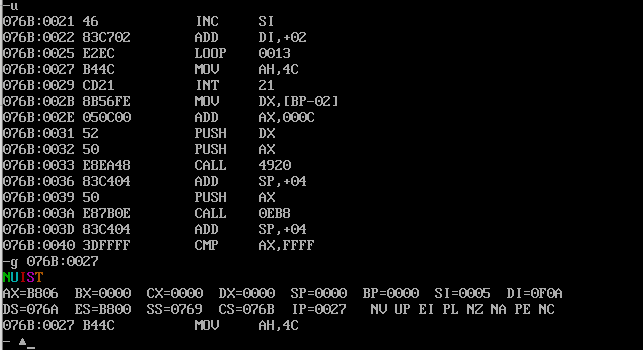
The function of line19 in the source code is to use the and operation to turn lowercase uist into uppercase
Modify the value of 5 byte units in line4, reassemble, link, run and observe the results.
db 2,3,4,5,6 --> Change to: db 5 dup(2) or db 5 dup(5)
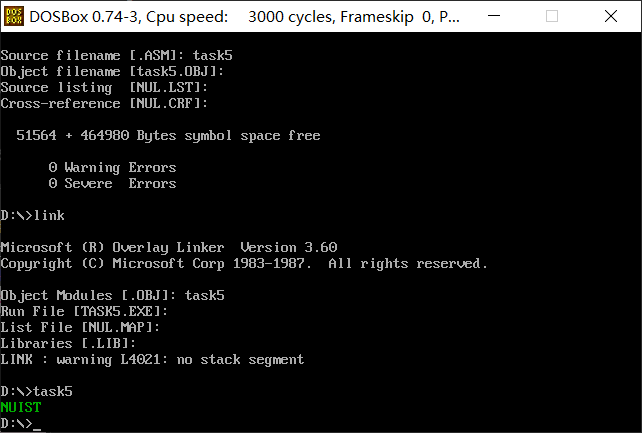
Based on observation, analysis and guess, the numerical function here is to control the color of NUIST
6. Experimental task 6
task6.asm
assume cs:code, ds:data data segment db 'Pink Floyd ' db 'JOAN Baez ' db 'NEIL Young ' db 'Joan Lennon ' data ends code segment start: mov ax,data mov ds,ax mov bx,0 mov cx,4 s: mov al,[bx] or al,20h mov [bx],al add bx,16 loop s mov ah, 4ch int 21h code ends end start
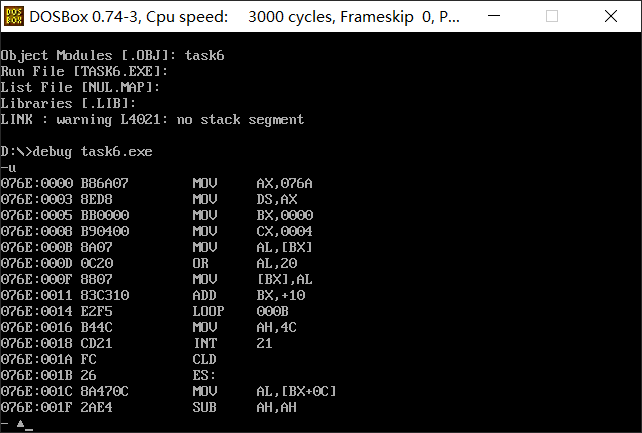
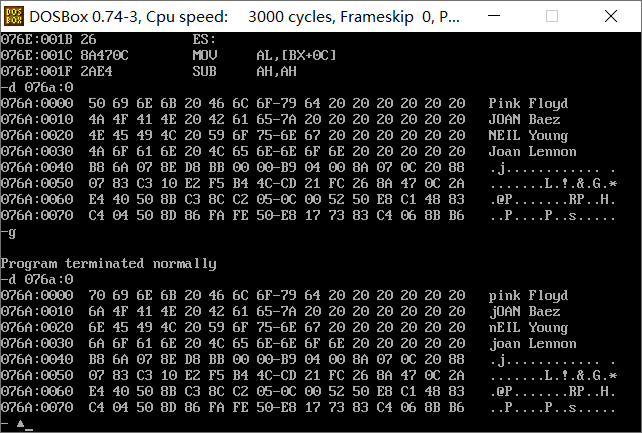
7. Experimental task 7
task7.asm
assume cs:code, ds:data, es:table data segment db '1975', '1976', '1977', '1978', '1979' dw 16, 22, 382, 1356, 2390 dw 3, 7, 9, 13, 28 data ends table segment db 5 dup( 16 dup(' ') ) ; table ends code segment start: mov ax, data mov ds, ax mov ax, table mov es, ax mov bx, 0 mov bp, 0 mov cx, 5 years: mov ax, [bx] mov es:[bp], ax mov ax, [bx+2] mov es:[bp+2], ax add bx, 4 add bp, 10h loop years mov bp, 5 mov cx, 5 income: mov ax, [bx] mov es:[bp], ax add bx, 2 add bp, 10h loop income mov cx, 5 mov bp, 10 people: mov ax, [bx] mov es:[bp], ax add bx, 2 add bp, 10h loop people mov cx, 5 mov bp, 5 averageincome: mov ax, es:[bp] mov bl, es:[bp+5] div bl mov es:[bp+8], al add bp,10h loop averageincome mov ah, 4ch int 21h code ends end start
